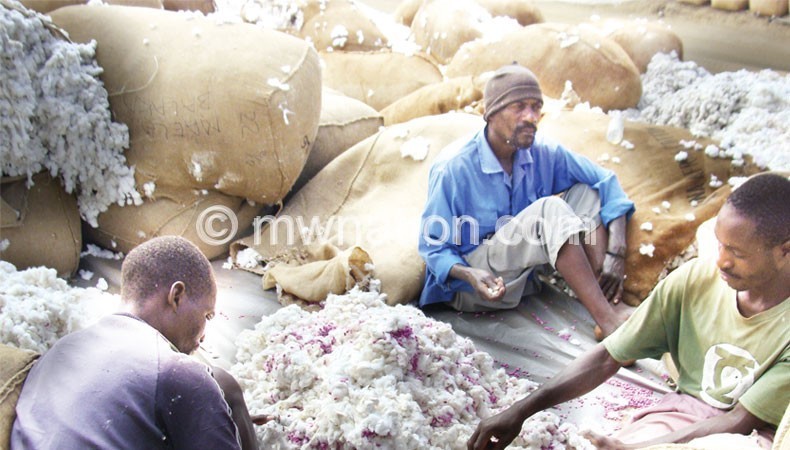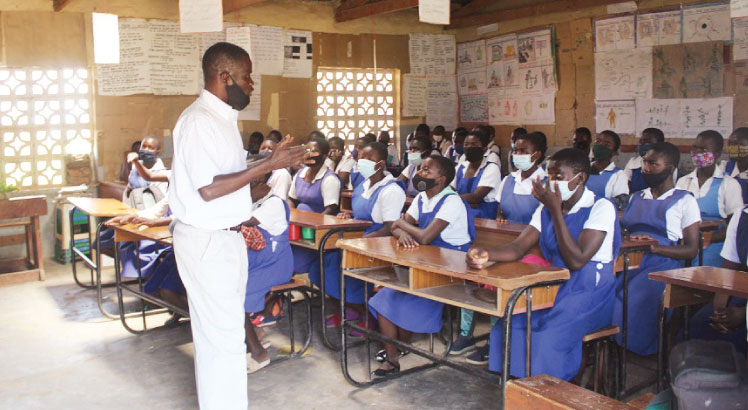Unmasking the truth about BT cotton
Malawi might soon have the first experience with GMOs if government releases the seed to the farmers for open trials after two successful confined trials. But, what actually is Bt Cotton and what hopes and fears are associated with it in Malawi?
Cotton, at least by now, is one of Malawi’s most important cash crops. It ranks fourth as a foreign exchange earner for the country after tobacco, tea and sugarcane.
But, with unrelenting global anti-smoking lobbies, experts believe it could take tobacco’s number one spot.
The crop has immediate potential to impact Malawi’s overall growth for several reasons, including the creation of more jobs if the integrated cotton textiles and garment chain is vibrant. Secondly, there is capacity for Malawi to produce more than 100 000 metric tonnes of seed cotton by more than 200 000 farmers as long as there is a conducive production and marketing environment.
For instance, during the 2002/03 growing season, the private sector through the Cotton Development Association (CDA) introduced a farm input subsidy programme which resulted in a remarkable increase in seed cotton production. But this programme only lasted for two seasons.
Over the years, government focus has been to increase cotton production and improve quality in order to meet local demand and export any surplus. Unfortunately, it is mostly smallholder farmers who grow the crop. The few large commercial farms that were growing the crop abandoned it due to declining profitability.
However, even among smallholder farmers, there is great concern of low productivity.
Most farmers—according to board chairperson of the Cotton Farmers Association of Malawi (Cfarm) David Rice—complain of pests and the quality of seeds they use.
“For instance, this year has been the worst. Most farmers have been hit by a pest called mealy bug and yields have greatly declined,” he says.
Bt cotton alternative
With the challenge of low productivity facing Malawian smallholder cotton farmers, experts argue that genetically modified cotton seeds, popularly known as Bt cotton, would provide a better alternative.
According to Chancellor College geneticist Dalitso Kafumbata, Bt cotton is a GMO seed created in the laboratory using high technology and sophisticated methods of genetic engineering.
“The seed is produced from unrelated organisms thereby crossing the natural barriers of reproduction. The Bt cotton variety that has been tasted at Lilongwe University of Science and Technology (Luanar) is one seed in which a gene from a soil bacterium has been inserted.
“The bacteria, Bacillus thuringiensis (Bt), naturally produce a toxin that kills stalk borers. The gene responsible for this toxin was inserted into the cotton seed so that the seed also produces the toxic product and protects itself.
“There is no loss of vigour with GM seeds as the new gene becomes part of the organism forever,” he says.
In Africa, Bt cotton is yet to gain ground as it has been accepted and being grown in three countries only.
South Africa was the first to adopt Bt cotton for its farmers. Studies show that economic gains from Bt cotton for South Africa for the period 1998 to 2013 was $1.6 billion and $313 million for 2013 alone.
In 2014, Burkina Faso was in its seventh year growing Bt cotton. Studies show that the country experienced a 67 percent reduction in pesticide use and also achieved a 20 percent yield increased compared to conventional cotton. Economic gains from 2008 to 2013 from Bt cotton for Burkina Faso was $137 million and $37 million for 2013 alone.
Sudan is another country that, by 2014, was in its third year growing Bt cotton.
An additional seven African countries—Cameroon, Egypt, Ghana, Kenya, Malawi, Nigeria, and Uganda—have conducted field trials on cotton.
However, despite the steady entry of GM cotton in Africa, there is serious resistance among some quarters to have the seed taken to the farmers.
For instance, last year a grouping of some civil society organisations (CSOs), led by the Commons for EcoJustice, rapped Monsanto, a multinational agrochemical and agricultural biotechnology corporation, for applying to government to release the Bt cotton seed.
In a statement released on July 4 2014, the grouping argued that Monsanto’s application ignored socio-economic issues and does not conform to the guiding principles of the National Biotechnology and Biosafety Policy (2008) in terms of addressing needs and concerns of other equally important actors in farming, such as the organic growers.
“As far as we are concerned no cost-benefit analysis has been carried out to support Monsanto’s claims that this technology will benefit cotton farmers in Malawi.
“In fact, the only visible benefit in the application is the massive financial returns Monsanto stands to gain from this adventure and nothing substantial for Malawi.
“The anticipated socio-economic risks outweigh any envisaged scientific gains that have been outlined in the application by Monsanto,” read their statement.
Kafumbata, however, says with Bt cotton, as it is with any other technology, there will always be equity and safety questions.
“Cars, trains, ships, aeroplanes do kill us but we have not abandoned their use, rather we have promoted regulated use without reckless abandon.
“Despite its perils, wherever technological progress has occurred, it has created the material foundations of prosperity and security for broad classes of society. Notwithstanding the benefits that accrue from judicious application of GM, as with any form of innovation or emergent technology, there are risks and/or adverse impacts,” he says.
He adds that Malawi faces the dilemma of creating a suitable atmosphere for the integration of Bt cotton while providing an adequate regulatory framework to ensure optimum safety.
“There will be nothing like ‘zero risk’ but a well-structured and administered biosafety oversight mechanism can facilitate safe development, application, transfer and commercialisation of biotechnology products,” he says.
But on their part, a Luanar biotechnology expert, Professor James Bokosi argues that Bt Cotton has enormous capacity to turn around the economic fortunes of the country’s farmers and also the nation at large.
Professor Bokosi, who is the trial manager for Bt cotton confined field trials (CFT) at Luanar, notes that being rated one of government’s strategic crop and also promoted as part of the country’s poverty reduction strategy, high yields of cotton could significantly widen the country’s narrow export base which is heavily reliant on tobacco.
He adds that the adoption of Bt cotton seed could significantly increase cotton production in the country—something that could have an economic advantage to the farmers and the nation at large.





